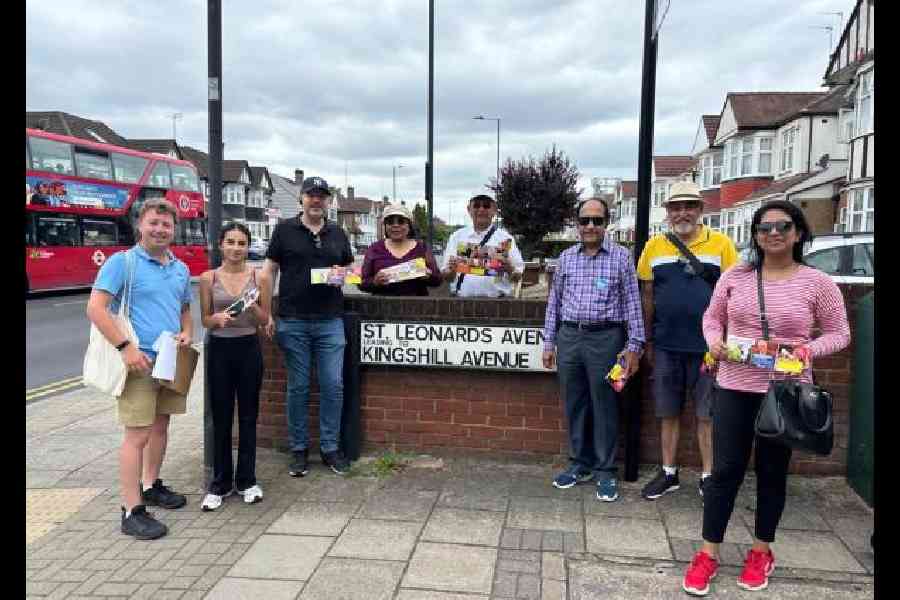Mr Sunak, I think you made a fair job of being a chancellor, but you are a pretty mediocre Prime Minister. Sir Keir, I think your strings are being pulled by very senior lit members of the Labour Party. Are you two really the best we have got to lead this great country? asked an elderly gentleman at the last television debate between the British PM and his main challenger.
Direct, as direct as one can think. This question and many like this, though non televised, form the crux of campaigning in Britain.
Uninteresting to the foreign eye, but a system that has matured since 1802 when the first elections for the House of Commons were held, elections and campaigns are organised, systematic and smooth. A week prior to the voting day, one can get in and out of the country without getting an iota of a hint that elections are being held.
Singer Taylor Swift’s three-day long Eras tour in London got around 200,000 fans including the Royal family members, Hollywood celebrities, British stars and even Labour Leader Keir Starmer to the Wembley Stadium. As poll pundits say over four weeks in the election campaign these many people wouldn’t have turned up to listen to both Starmer and Sunak in their election meetings. It took me five days to spot the first support placard, an indicator that people proudly confirm who they will be voting for.
Powered by placards, leaflets, letters of endorsement, reminders of the petitions that they have placed in Commons for their constituents, MP’s power their campaigns.
The campaign is a monotonous drill, charted well in advance and executed meticulously. I got the first-hand experience of the campaign of four-time Conservative MP and Padma Shri recipient Bob Blackman.
It usually worked in three shifts 10am-12 noon, 1pm-3pm and 4pm-6pm through the first four weeks of the campaign seasons focusing primarily on canvassing and delivery for the candidate and in the last week they add a phone call in the evening shift.
During canvassing, the candidate along with his councillors who represent the party in local bodies does door knocking and visits each house that the back-end team has marked for them.
A volunteer carries, map and master voting sheet, which has the details of each voter charted to perfection. The affiliation of each household and in some cases voting preference of individual voters is noted. In most cases it is also noted when the household reviewed the last phone call or communication from the MP or his team member and for what.
A team member approaches each house with a letter/leaflet with a comment from the lead, who is directing them. They make a pitch seeking support for the candidate and at times are countered with complaints, that they direct to the local representatives who are present with them.
“We engage and resolve the issue, make a note of the serious ones and pass it to the campaign office,” informs Zach, a volunteer who is an IT professional leading the canvassing in the Kenton area. He said voters are very forthcoming. “They tell their preferences clearly.” When I countered, “How sure are they of the feedback being genuine?” “They speak their mind out and there is no fear or compulsion, their choices are clear and as our feedback and interactions is continuous for years we are sure of the feedback,” he says.
For a constituency of approximately 76,000 votes, Blackman has a team of 250 volunteers and an election expenditure cap of £18,000 or roughly ₹19 lakhs, that loosely translates into £4.2 or ₹450 per person in the constituency.
His campaign manager who doesn’t wish to be named shares that each constituency has a different expenditure limit based on the population. Usually, a constituency varies between 65,000 to 1,15,00 voters.
In the camp office for Blackman, a team of seven to eight volunteers are coordinating the leaflet distribution. Each day nine tables have a stack of around 20,000 letters and leaflets they have to deliver.
He has seven leaflets reminding people of what he has done and what he intends to do.
By the end of the campaign, we would have done a quarter of a million letters, leaflets delivered and Bob or his team would have at least knocked on each of the 32,000 plus households in the constituency proudly informs the campaign manager who doubles up as a local counsellor.
The drill is so robust that each candidate knows where they standing? We know the tide is against Conservatives and hence our messaging is all around Bob and it will be a referendum on his four terms says his manager when asked why Conservatives are missing from most of the communication.
The exercise is almost identical in their rival camp he informs, just that Labour is highlight of the campaign and not the candidate. While the campaign was somewhat of a shocker, even shocking is the fact that July 4, the voting day isn’t a holiday. It’s work as usual for the Brits as they go about electing their new leader.










